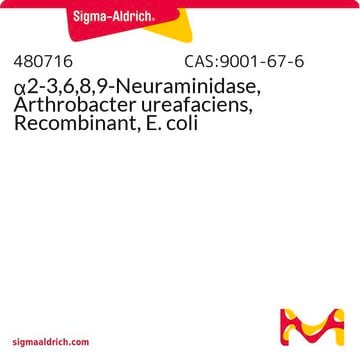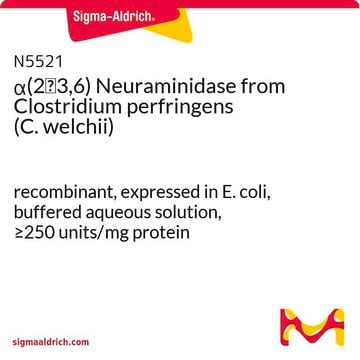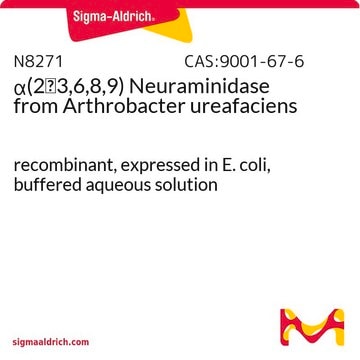480708
α2-3,6-Neuraminidase, Clostridium perfringens, Recombinant, E. coli
Synonyme(s) :
α2-3,6-Neuraminidase, Clostridium perfringens, Recombinant, E. coli, Acetylneuraminyl Hydrolase, Sialidase
About This Item
Produits recommandés
Produit recombinant
expressed in E. coli
Niveau de qualité
Gamme de produits
EMPROVE® EXPERT
Forme
liquid
Activité spécifique
≥10 units/mL
≥250 units/mg protein
Fabricant/nom de marque
Calbiochem®
Conditions de stockage
do not freeze
Activité étrangère
N-acetylglucosaminidase, α-fucosidase, α- and β-galactosidase, α- and β-mannosidase, proteases, none detected
Conditions d'expédition
wet ice
Température de stockage
2-8°C
Description générale
Application
Avertissement
Définition de l'unité
Forme physique
Autres remarques
Dwek, R.A., et al. 1993. Annu. Rev. Biochem. 62, 65.
Ohta, Y., et al. 1989. J. Biochem (Tokyo) 106, 1086.
Informations légales
Mention d'avertissement
Warning
Mentions de danger
Conseils de prudence
Classification des risques
Eye Irrit. 2 - Met. Corr. 1 - Skin Irrit. 2 - STOT SE 3
Organes cibles
Respiratory system
Code de la classe de stockage
8B - Non-combustible, corrosive hazardous materials
Classe de danger pour l'eau (WGK)
WGK 1
Point d'éclair (°F)
Not applicable
Point d'éclair (°C)
Not applicable
Certificats d'analyse (COA)
Recherchez un Certificats d'analyse (COA) en saisissant le numéro de lot du produit. Les numéros de lot figurent sur l'étiquette du produit après les mots "Lot" ou "Batch".
Déjà en possession de ce produit ?
Retrouvez la documentation relative aux produits que vous avez récemment achetés dans la Bibliothèque de documents.
Les clients ont également consulté
Notre équipe de scientifiques dispose d'une expérience dans tous les secteurs de la recherche, notamment en sciences de la vie, science des matériaux, synthèse chimique, chromatographie, analyse et dans de nombreux autres domaines..
Contacter notre Service technique







